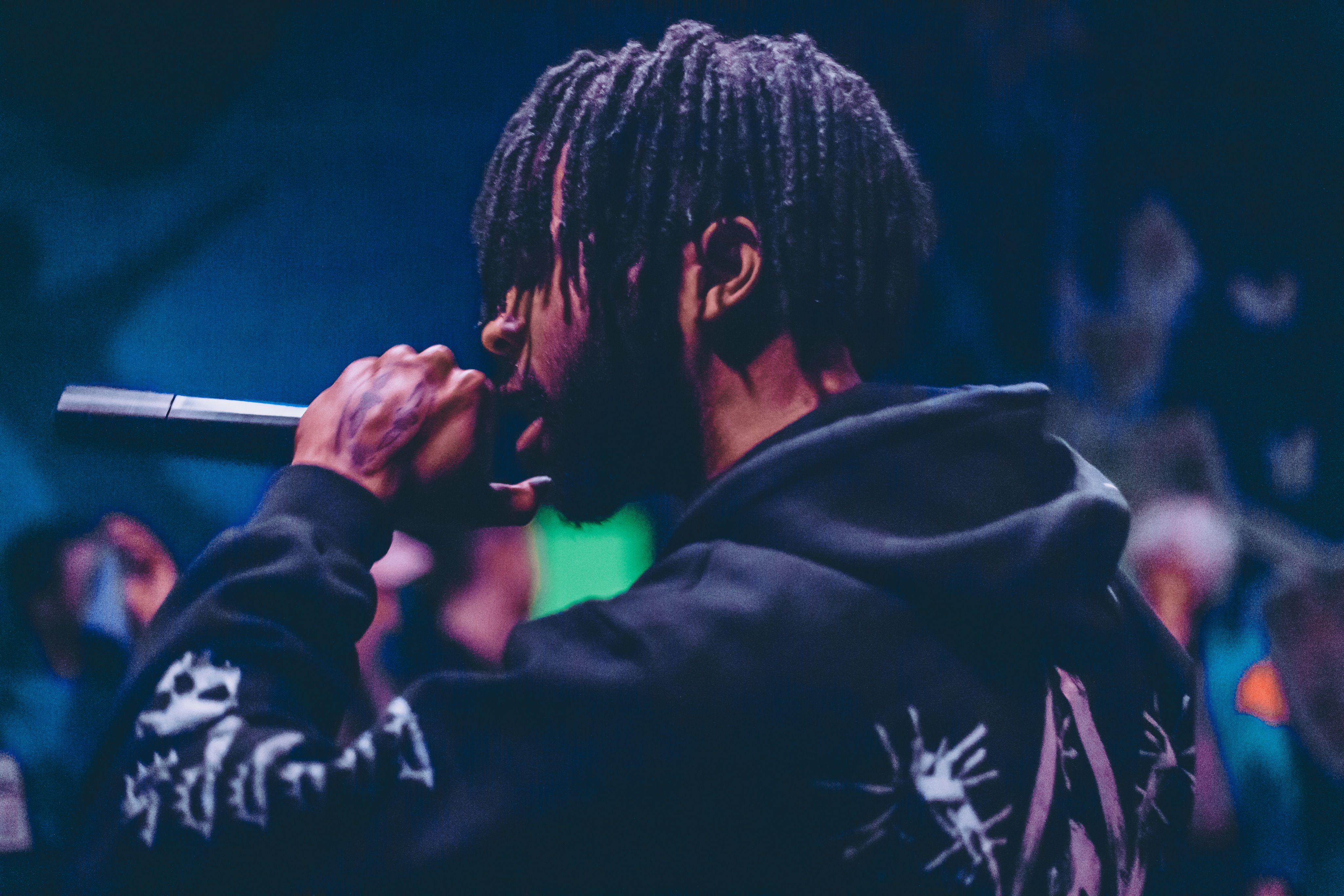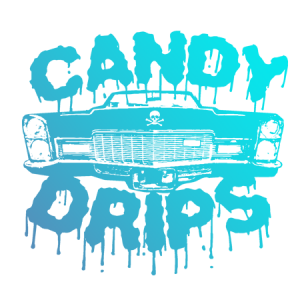 AJ Suede is one of the most thoughtful, dedicated rappers and producers I know of. His new album Gotham Fortress is maybe his best work yet. A dark, complex and intense project that walks the line between many sounds not just in rap but also AJ ventures into punk and hardcore, too.
AJ Suede is one of the most thoughtful, dedicated rappers and producers I know of. His new album Gotham Fortress is maybe his best work yet. A dark, complex and intense project that walks the line between many sounds not just in rap but also AJ ventures into punk and hardcore, too.
AJ and I are old friends and we’ve known each other since 2012. We were somewhat out of touch the last few years, and when I called him on a Tuesday afternoon (before both of us had work) for this interview it was great to catch up with him. AJ and I talked about his relatively recent move to Seattle, the process of making his new album, old skate videos, Skyrim and more…
Nick: How have you been? You’re on the west coast now, right?
AJ: Yeah I moved to Seattle.
Nick: Oh nice. I’ve never been there but I’ve heard it’s really cool. What brought you there?
AJ: There are a lot of people out here who’ve been listening to my music who lived out here who were like “yo, you need to come out here. Do some shows.” And I just stayed too long, you know?
Nick: Do you like it out there?
AJ: Yeah definitely. Weed is legal recreationally. Everyone is chilling. It’s cool. Minimum wage is $15 so I can still work part time.
Nick: Oh that’s right! That’s dope how high that minimum wage is. What are you doing for work?
AJ: I work at a pizza shop.
Nick: Oh word! Actually now that you say that I think you mention the pizza shop on the album. You talk about work a lot on there. There’s a line about punching a clock and I remember you mentioning working on the weekends.
AJ: Yeah that’s what I’m doing. That and the music.
Nick: You are a super hard worker and you always have been. And it’s good you’ve been able to balance working a job and working on music. You’ve been making music for a while now it’s been at least five years since I first heard stuff by you. Do you feel like anything has changed with the scene you’re a part of? I feel like with the sort of “internet rap” community things have changed but it’s hard to put my finger on it…
AJ: Yeah it’s pretty crazy how it went from what it was when a lot of people were getting covered on Mishka in like 2012 to where certain people are now. Even in Seattle. Inside the city there’s a whole bunch of artists who are very popular in the city and have no presence on the internet. And vice versa. When I got out here I knew a lot of people from the internet side of shit, and I knew a lot of people from playing around the city. I think I bridged that a little bit as far as getting locals to play shows with people who were popping online and just kinda bringing it all together. Seattle is dope for just music in general. Bands play with rappers. And there’s a whole bunch of boom bap, too. You know I love Boom bap and I still bump hella boom bap, and there is an element of that shit that goes on that’s older. But, they’re not as accepting of new shit, so I don’t really pay attention to that.
Nick: That actually is something I wanted to ask you about. I feel like with your music you kinda bridge the gap between Boom Bap or “real hip hop” shit and the new side of things. There’s so much criticism from older people of younger guys in rap now who are popular like Lil Uzi Vert and Lil Yachty. We saw the whole thing with Joe Budden yelling at Yachty. What do you think about that sort of rift between the older generation and newer rappers?
AJ: I mean it depends. It’s not like a general thing. I don’t really listen to Yachty. I like Lil Uzi Vert, he has hella shit I fuck with. But, I’m not really into auto-tune stuff. Some of the newer stuff I’m starting to hear is getting heavier and heavier into the auto-tune as things keep on evolving. But then There’s Roc Marciano praising Lil B for Black Ken. That’s one of the most East Coast Mcs in the game. There’s only a rift if you choose to have a rift. And, Joe Budden’s always been like that. But, as far as I’m concerned I’m gonna have bars regardless. And I love trap music, too. But, there’s a lot of stuff that I can’t get with.
Nick: As far as production goes you used to produce most of your own stuff, but on the new album you’ve worked with some other producers especially Wolftone.
AJ: Yeah that’s one of the people who brought me out here. I stayed on his couch for a minute before I got my own space. He’s been fucking with my music and was like “yo, come out here.” He’s played in hella punk bands he’s a big part of the Seattle scene. I was in the room when the beats were being made. I was like “yo, you have to take that out.” or “make that darker, speed that up.” I was there. It’s kind of a new sound. There’s only a couple people out here with it. Everybody who’s featured on the album was there in person. I wasn’t really living in my own space. I didn’t have my computer with me. So, I was making music when there was time to make music. It wasn’t like I would go in the booth and make some shit. It would be like once a week or maybe twice a week. But yeah when it came to features everybody was there.
Nick: One producer’s name that stood out to me on the album is Spaceghostpurrp. That’s a name I haven’t seen in a while, and that’s maybe because I kinda haven’t been paying attention. But, is he someone you’ve known or is this collab kind of a new thing?
AJ: I have like two other joints on his beats. We’re not really in touch though.
Nick: I’ve always thought his production was his biggest strength and his beats are unique for sure. When I heard the track he produced I knew right away like “this is the Spaceghost one.”
AJ: I haven’t heard him make a beat like that before, though. I was pretty hype.
Nick: Yeah it’s true. That track has his sound but it does feel different kinda.
AJ: It wasn’t supposed to make the tape, but I fuck with it. It’s just because that’s the only one where I wasn’t in the studio with the producer. But, other than that it definitely belonged there.
Nick: Is it different rapping on other producers’ beats vs. your own stuff?
AJ: Nah for a while I was only rapping on stuff I produced. Like on Gold and Water and all that. But that one year that I dropped like twelve I got to jump on beats that were so many different sounds that it made me a better rapper. You only have a one track mind if you’re only rapping on your stuff and you learn how to be a better producer just hearing what other people do. Now it’s perfect, though. I was in the room the whole time, so everything was being written while the beat was being made. It just worked out.
Nick: Yeah sounds like you were almost like an “executive producer” or something like the whole thing is your vision.
AJ: Yeah, but it was a good combo the whole time. The whole thing was in sync.
Nick: That’s cool you were able to work in the same space. I feel like that’s rare, too. Most collabs happen over the internet like over email or whatever. But you were able to work together in person.
AJ: Yeah anytime I work with somebody over email it doesn’t work. That’s why I don’t really do any verses that way unless somebody’s buying them. Sometimes somebody might record a line, have something a little too loud. And then you have to keep sending emails back and forth. It’s just not organic. It can be, but in general it’s not.
Nick: You mentioned earlier how in the music scene in Seattle there’s kind of a cross pollination of punk and rap. And it makes a lot of sense that you are working with people like Wolftone who’s in both worlds. I can hear that sound in the album especially on “Cryptocurrency” and “Iconoclast.” That feels like a new direction for you. The screaming is awesome. When I was listening for the first time and I heard you doing those screaming vocals I was like “Holy shit!” It’s dope. I really like how extreme it is. Is hardcore and kinda more intense punk stuff something you’ve always been into?
AJ: Yeah, but that was all through skate videos. And Tony Hawk games. That put me on to punk really early. And I always wanted to do that. I kinda waited till it was a little bit more authentic and I was chilling with enough people who knew what was up.
Nick: You definitely pulled it off. “Iconoclast” might be my favorite track on the album. I love the energy you brought to it.
AJ: That sample on “Iconoclast” is from a recording of one of Wolf’s old bands. He took the distortion of the guitar off of it and turned it into that beat. I wanted something that’s in 3/4 time signature where we could do breakdowns and hit different tempos. At this point I’m really just exercising my lyrical ability because I’ve gone on so many different types of beats. So, I wanted something in a different time signature. That was one of the first tracks I made for the album we made that three maybe four months ago.
Nick: Earlier you mentioned how you wanted a dark sound for some of the beats, and a bunch of times on the album you mention darkness. There’s a line “I keep the candles around because I know the dark is afraid of the light.” and you mention feeling like you’re surrounded by vampires at one point. The whole song “Negative Energy” is like a struggle against negativity and stress, trying to not let it drag you down. I feel like there is a lot of anxiety and kinda dread on this album. And I know darkness has always been a part of your music. But, do you feel like it is more a part of Gotham Fortress than your earlier work?
AJ: I think that has a lot to do with the area. It’s just always raining. It hasn’t rained in three months since its been summer. But, it’s very gloomy. That lack of sun. Seeing people who were born and raised here it does make people negative. Really dark really depressed.
Nick: That’s interesting that Seattle’s weather has that much of an effect on people. It’s almost surreal or something.
AJ: Yeah I mean I always kinda had that feeling. But, it wasn’t matched. when I moved here there’s people out here who can match that a lot better. When I was in New York and in parts of PA, sure. But, here it’s definitely a different atmosphere. Living here a lot of what people do is indoors because it’s always raining. We were in the studio all the time when it was raining. And that could be twelve days at a time easily.
Nick: Wow.
AJ: Yeah it’s crazy, but I think the result though is a lot of people are multidisciplined artists. Like everybody plays more than one instrument to a certain extent. And I think it’s because you’re forced to spend so much time inside. A lot of the people I’ve been working with here are just used to being inside working.
Nick: You get pretty political at times on the album. It’s not like overbearing or too heavy handed but you definitely have some moments. There’s a diss to Bill O’Reilly and you call out fake woke people. There’s an alt-right diss, too. Do you feel like this is more political than you’ve been in the past? I mean now is definitely the time to get political.
AJ: Yeah I mean I’ve always spoke about stuff. When I moved here it was January 16th I think the inauguration was the 18th or the 19th? This is a big protest city. Living in PA I’ve seen what was going on during the election. I’ve seen all the confederate shit. I’ve always not been receptive to it, obviously. But at least around here nobody was either. On all fronts. But yeah, that was just a result. A lot of good punk music came out. Good punk music and most good music in general, even hip hop, comes out when there’s some republican dickhead in office. And it’s not like this is a left or right thing. Because I think the very very very far left can be intolerant as well. And borderline delusional. But I’m definitely not fucking with that alt right neo nazi shit. And I’m making that really known. Especially because I know people who I grew up with who voted that way. You gotta speak out because shit’s not right.
Nick: Absolutely. This is a much less serious question, but you’ve always made references to sort of “nerdy” stuff like video games. And those kind of references come up a lot on Gotham. There’s a line where you mention Tomb Raider. And I think you say “always watching sci fi” on a song, too. Of course, I’ve always been into games. Are you still playing video games? Is there anything you’re into right now?
AJ: I don’t have the time.
Nick: Yeah unfortunately it’s the same for me.
AJ: I mean before though I was playing Skyrim for like four years.
Nick: Yeah that’s a classic!
AJ: I got Elder Scrolls Online and played that for a little bit. But, I just don’t have the time. I had to get in the studio. You know, when were people playing computer games I was on Abelton. But, I grew up on that.
Nick: Earlier You mentioned how rapping on other producers’ beats has helped improve you as a rapper. And, I wanted to ask about being both a producer and a rapper. Do you think being a producer yourself helps has helped you with rapping? And maybe vice versa?
AJ: I don’t think it does. I think it can make you overthink your rapping. And it definitely makes you overthink your engineering. I think just working on being a better rapper has made me a better rapper. Focusing less on being a producer has made me a better rapper. When I go from an intense period of producing to trying to jump right back into rapping you focus too much on the math of the rapping instead of just following how you feel.
Nick: Do you feel like trying to be a better rapper has been your main focus lately?
AJ: Nah I’ve just been living. But, now that I took those six, seven months I’m working on producing right now. Like as of the last two weeks. I’ve jumped back into it. I got a new laptop and all of that. And I’ve had this whole entire period of working around dope producers. Now that it’s time for me to get back into it I’m sure that I’ll be better than I was.
Aj’s latest full length release ‘Gotham Fortress’ is available for download and stream on most major outlets as well as bandcamp and soundcloud.
Limited edition cassette’s of Gotham Fortress are available as a co-release from Black House Records and Candy Drips.
Looking for more music from this artist? go to Ajsuede.com

